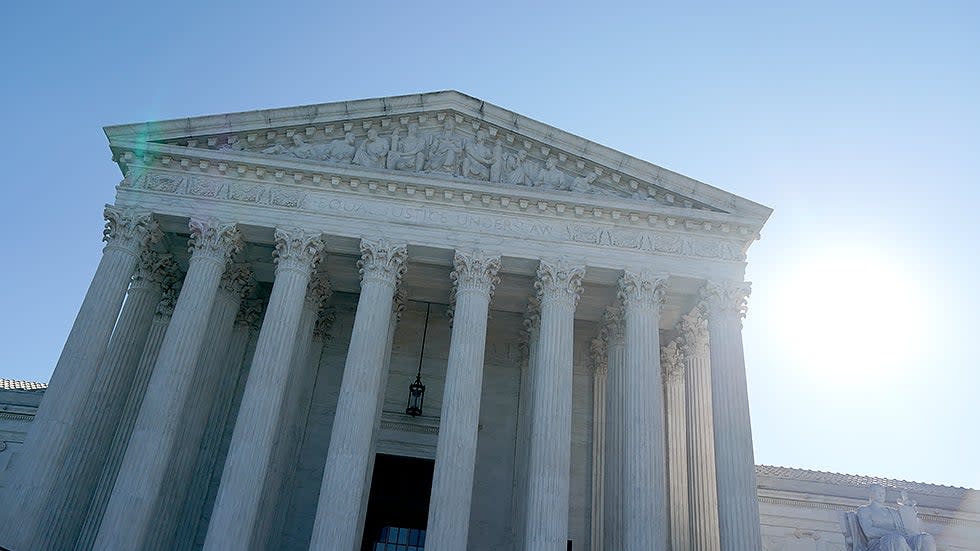Supreme Court seems wary of Boston's refusal to allow flying of Christian flag

A majority of Supreme Court justices on Tuesday appeared skeptical of Boston's refusal to allow a Christian flag to be briefly flown on a flagpole outside City Hall.
During oral argument in the First Amendment clash, some of the court's justices - conservative and liberal - questioned whether the city's restriction on religious flag-flying was compatible with constitutional speech protections.
At issue was Boston's refusal to permit a religiously affiliated group called Camp Constitution to fly a Christian flag bearing the Latin cross to commemorate Constitution Day and honor the Christian community's civic contribution.
One pivotal question in the case is whether Boston, by making a flagpole on City Hall Plaza available for use by certain outside groups, had created a forum for private speech, or whether the flying of third-party flags amounted to a government-backed message.
Several justices seemed to view Boston's largely permissive track record as indicating that the flagpole constituted a forum for non-government speech. Prior to Camp Constitution's application in 2017, the group's lawyers said, the city had approved more than 280 flag-raisings over a 12-year period without issuing a single denial.
"The city, by an unbroken history and practice and policy, expressly declared that the flagpoles are one of its public forums open to all applicants," said lawyer Matthew Staver. "In doing so, the city long ago crossed the line from government speech to private speech."
Justice Samuel Alito, one of the court's staunchest conservatives, asked a lawyer for Boston how to reconcile such a policy with First Amendment speech protections.
"Is it consistent with the principles of the Free Speech Clause if you say anybody can speak, except we are going to monitor what is said and we're not going to allow religious speech?" Alito asked.
Douglas Hallward-Driemeier, who represented Boston, urged the justices to view the third-party flags as government speech, arguing that an ordinary observer would view them as such. He noted that the flagpole at issue typically flies the Boston city flag, stands adjacent to an American flag and Massachusetts commonwealth flag on permanent display outside City Hall and that the city retains physical control of the raising of flags.
Hallward-Driemeier cautioned about what might follow if city officials were forced to relinquish control over its contents.
"What the city cannot afford is the idea that the flagpole has become a place where... the swastika flag, ...the confederate flag, ISIS, al Qaeda, all of these could be flown," he said. "The outcome in this case has to be the same, whether this is the Christian flag, ... or the New York Yankees flag."
"The city is either compelled to raise all of them or none of them, because it is the city's speech," he added.
Sopan Joshi, lawyer for the Biden administration, which supported the challengers, argued that Boston had not exercised the degree of control over its flag policy that is typically associated with government speech. He said city officials could fashion a different approach that complies with the First Amendment while weeding out offensive messages - which might transform the flagpole into something akin to a symposium, but not a free-for-all or an "open mic night."
Several justices seemed to take the view that Boston's rejection of the Christian flag was based on a misapplication of the First Amendment's Establishment Clause. That provision requires that the government not favor one religion over another.
Justice Brett Kavanaugh emphasized that the Establishment Clause also requires that the government remain neutral in dealing with religious and secular groups, and said the city's confusion over that point was "the root cause" of the dispute.
"When you have government property that's opened for a forum for speech or for use, there is a mistaken understanding that has existed that if you allow a bunch of secular groups and then allow a religious group to use it, that you've violated the Establishment Clause by doing that," Kavanaugh said. "Isn't the answer to that to say equal treatment of religious groups or religious speech is not an Establishment Clause violation?"
Camp Constitution appealed to the Supreme Court after losing in the lower courts. A decision in the case, Shurtleff v. Boston, is expected by this summer.

